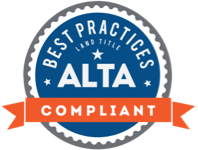Congratulations on taking this huge step. Buying a new home can be both exciting and stressful. Particularly as the closing date nears, incorrect details and overlooked issues can cause last-minute scrambles or delays.
Based on our deep experience of 16,000+ closings over the past 16 years, here are some common issues and mistakes to avoid for a settlement as smooth and stress-free as possible.
1. Double-check documentation
Many settlements are delayed or derailed when the documentation is incorrect or incomplete. By law, homebuyers must receive a few key documents before the closing:
- Closing Disclosure (CD). This must be provided at least three business days before the closing date. It includes the final terms of the loan, projected monthly payments, and a detailed list of closing costs.
- Title documents. Including the title insurance policy details, which outline any potential issues with the property’s title.
- Loan Estimate. This should be received early in the loan application process but is crucial for comparison with the Closing Disclosure.
In particular, check the following:
- Correct personal details (name, address, etc.)
- Accurate listing of all fees and taxes charged and credits given
- Any unusual items or unexpected costs
- Accurate math (sometimes costs that have already been paid are still charged, or added rather than subtracted)
Take the time to review everything. Even simple mistakes, such as a misspelled name or transposed numbers in a property description, can cause delays. Cornerstone can review documents with buyers before settlement to ensure that everything is complete and accurate.
2. Ask the Right Questions
Homebuyers should ask several critical questions well before closing to avoid surprises:
- What are the final closing costs I will be required to pay?
- Are there any pending issues with the title that need to be resolved?
- What documents will I need to bring to the closing?
- Can I review the closing documents beforehand for any discrepancies?
- Is there a homeowners’ association or other entity that controls or limits what I can do with the property?
3. Don’t Make Financial Mistakes
Once financing is finalized, be aware of financial moves you should or shouldn’t make. Many buyers have assumed that, once a lender approves a loan and the terms of the loan, they’re free to make other expenditures. More than one loan has been canceled after buyers made a major purchase, such as a new vehicle, before settlement. Once the lender learns of the new loan, the pending mortgage loan may be canceled. Keep an eye on appraisals and other last-minute financial details that may affect interest rates or loan amounts.
4. Understand the Process
Out-of-town homebuyers—or anyone not familiar with the New York real estate process—may not be fully aware of who does what before, during, and after settlement. One wrinkle that surprises many is that most jurisdictions in New York do not accept electronic signatures for the recording of real documents. Even if portions of the transaction involve electronic signatures, original documents must be signed in ink (called “wet ink” signatures). Cornerstone can provide extensive guidance about the process to help educate homebuyers and increase peace of mind.
5. Choose the Right Title Company
Because all title insurance companies charge similar fees, which are government-regulated, many buyers don’t think about which title company to choose. Often, they select the one recommended by the lender, settlement attorney, or real estate attorney.
There are two reasons why buyers should choose their own title insurer.
First, it is a federally protected right and a highly suggested best practice for the home buyer to select their closing/title company. Attorneys, agents, or lenders attorneys may not inform buyers of that right or disclose whether they have a financial interest in using their selected title company. The Real Estate Settlement Procedures Act (RESPA) guarantees the right of homebuyers to choose their title insurance provider.
Second, a company such as Cornerstone can add value and reduce stress throughout the entire buying process. Well before settlement, we can do a deep dive into the property title and identify any restrictions, covenants, liens, or other issues that may affect either the settlement or the property itself. We can explain and estimate all closing costs and fees well before settlement to avoid surprises. Because we’re not connected to anyone else involved in the real estate process, we can provide expert, unbiased advice at every step of the process.
By involving Cornerstone early in the buying process, many potential issues can be proactively identified and resolved to ensure a smoother closing.




